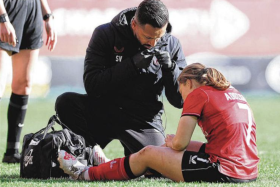Scars left by Sars crisis remain
When the severe acute respiratory syndrome (Sars) hit Singapore in 2003, taxi drivers rejected passengers going to hospitals, companies hastily formulated plans to let staff work from home, and some people lost their jobs.
The viral respiratory disease infected 238 people here and killed 33, including doctors and nurses.
Memories of those dark days have been flooding back lately with the outbreak of the Wuhan virus.
Sars arrived here after three Singaporean women returned from holidaying in Hong Kong in February 2003. They were hospitalised for pneumonia between March 1 and 3.
Two recovered without infecting anyone, but one of them infected 22 close friends and family.
She was dubbed by officials as "super-infector No. 1".
Her parents and pastor, who contracted the disease while visiting her in hospital, later died.
Recalling how worried Singaporeans were during that period, sales support analyst, Mr Mohd Ali Khan, 37, said: "I remember sitting in the MRT and there was an elderly man in front of me.
He coughed and I could see the fear on the other passengers' faces.
"People started going to the other cabins till the one I was in was almost empty."
On March 22, 2003, Tan Tock Seng Hospital (TTSH) was made the designated facility for isolating and treating suspected and probable Sars cases.
People stayed home and avoided public places like swimming pools and malls, and many retailers suffered.
TTSH doctor Ong Hok Su became the first hospital worker to die from Sars on April 7, 2003.
Four other healthcare workers died, including vascular surgeon Alexandre Chao and nurse Hamidah Ismail, after coming into contact with Sars patients.
Nurse Hamidah was one of the first nurses warded for Sars and died on Mother's Day in May that year.
In April that year, it was chaos at the Pasir Panjang wholesale market after Sars killed a vegetable wholesaler.
Baskets and boxes of vegetables lay around unclaimed and were left rotting, as cleaners wore masks to disinfect the place.
The Government cut Singapore's economic growth forecast for 2003 from 2-5 per cent to 0.5-2.5 per cent.
The Sars outbreak also forced the closure of schools for about 10 days, which led to the introduction of e-learning for students.
Localisation manager Siti Farishah, 34, recalled: "I was in pre-university and my school became paranoid about doing temperature checks and sending students, who showed the slightest signs of the sniffles, home."
Every student and teacher and Singapore Armed Forces personnel were also given thermometers so they could check their temperature twice a day.
The scars left by Sars remain.
LESSONS
Last Wednesday, at a press conference, National Development and Second Finance Minister Lawrence Wong reminded Singaporeans about behaving responsibly if they were ill.
He said: "If you have a cold and need to go out, wear a mask, wash your hands regularly.
"These are the lessons that we got from Sars and we need to remind ourselves to not be complacent."
Get The New Paper on your phone with the free TNP app. Download from the Apple App Store or Google Play Store now


